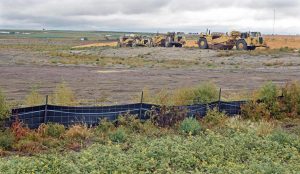
While Black Lives Matter protesters want to tear down a Teddy Roosevelt statue in New York City, the North Dakota Supreme Court has sided with state environmental regulators in one of two legal challenges to a proposed oil refinery near Theodore Roosevelt National Park.
The opinion issued this week upholds a lower court ruling that affirmed permitting decisions by the Department of Environmental Quality, which in June 2018 issued an air quality permit to construct the facility. The state Supreme Court ruled that the department “did not act arbitrarily, capriciously, or unreasonably in issuing the permit,” according to the Bismarck Tribune.
“It really is a reflection of the hard work that goes into these permits,” said Dave Glatt, director of the department. “It was about a two-year process working with the company, making sure the science and engineering was right.”
The head of Meridian Energy Group, the project developer, called the ruling “very welcome.”
“I’m glad that there’s one more obstacle that’s been removed,” CEO William Prentice said.
Yet the project faces a new obstacle — the coronavirus pandemic, which sent oil demand and prices plunging this spring. Despite the downturn in the oil industry, Prentice said the company is pursuing financing for the project, which is expected to cost around $1 billion. Meridian, which began initial dirt work at the site west of Belfield in the summer of 2018 but has not yet erected the facility, is now eyeing 2023 or 2024 to finish construction.
“When we first started this process five years ago, we thought we would be in operation by now,” Prentice said.
The National Parks Conservation Alliance sued Environmental Quality and Meridian in July 2018, asking the court to revoke the project’s permit and require the department to revisit the matter.
The group called the Supreme Court’s ruling “a major setback for the preservation of Theodore Roosevelt National Park and all it protects.”
“We’re deeply disappointed in the decision,” said Stephanie Kodish, clean air program director for the association. “This facility is going to emit hazardous air pollutants and volatile organic compounds along with other pollutants that are damaging to the environment, and we are concerned about the harm of air pollution to visitors to the park.”
The group, in its lawsuit, contended that the state had unlawfully issued a permit to Meridian and that the permit did not include enforceable limits for air pollutants.
The state argued that its permit does adequately control emissions, in part by requiring a leak detection system that involves using an optical imaging camera to find leaks of gases known as volatile organic compounds, as well as monitors at the perimeter of the facility to measure for benzene, a carcinogen. An attorney for the department said during oral arguments in November that most hazardous air pollutants are also considered volatile organic compounds.











 READ MORE00:15/00:15
READ MORE00:15/00:15
